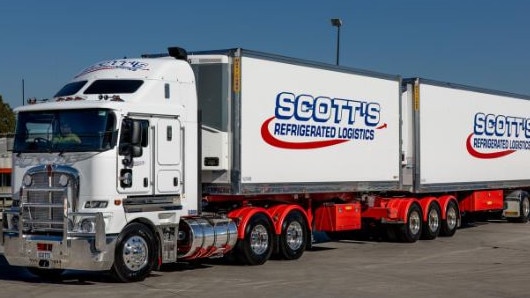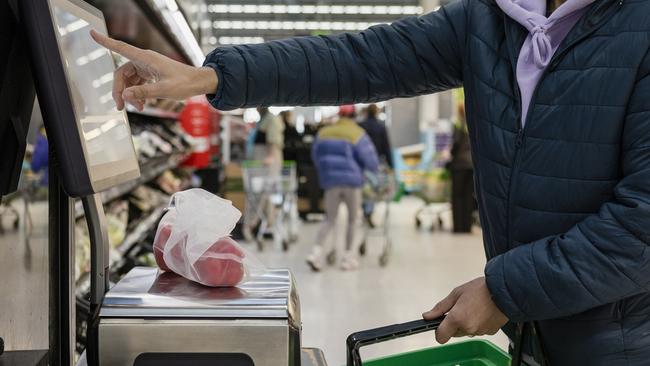‘Won’t be the last’: Expert warns of soaring grocery prices ahead as freight industry crisis explodes
The devastating collapse of a major Aussie freight company “won’t be the last”, with “higher prices” for supermarket shoppers looming.
Companies
Don't miss out on the headlines from Companies. Followed categories will be added to My News.
The devastating collapse of a major Aussie freight company “won’t be the last”, with “higher prices” for supermarket shoppers “undoubtedly” on the cards.
That’s according to Road Freight NSW CEO Simon O’Hara, who told news.com.au the industry was in the grip of a major crisis that would lead to yet more pain at the checkout for families already battling a cost of living nightmare.
On Monday afternoon, news broke that Scott’s Refrigerated Logistics – one of Australia’s biggest trucking firms, which supplies all major supermarkets, including Woolworths, Coles, IGA and Aldi – had been plunged into receivership.
It has left 1500 jobs in the lurch and the delivery of food supplies at risk after the company folded due to being battered by labour shortages, extreme weather events and skyrocketing fuel costs.
However, Mr O’Hara said the situation was “just the tip of the iceberg” for the struggling sector, and that supply chains would certainly be impacted.
“Scott’s has been a major part of the refrigerated transport space for some time, and this is significant. What we’re seeing for the first time is a larger, more significant part of the supply chain going into insolvency,” he explained.
“What we’ve been seeing for about the last 12 months is a number of road freight companies and truckies deciding they no longer want to remain in the industry and pulling the pin.

“It’s symptomatic of what’s been happening in the freight industry, and this won’t be the last.
“It’s the tip of the iceberg and we’re going to see more, and unfortunately we will see the supply chain affected undoubtedly, given the shortage of new trucks coming into Australia.”
Mr O’Hara explained the industry had been stretched to the limit during the Covid pandemic, and was then hit with a shortage of AdBlue – a crucial component of diesel fuel – before being slugged with soaring costs.
“It’s been flat chat for years, and some won’t make it due to financial reasons, and others will make the conscious decision to pull the pin,” he said.
“Some businesses will make the decision [to exit the industry] based on it being too hard – they don’t want to do this anymore, they want to retire early, or do something else.
“So there are two different reasons for exiting the freight industry, and it will have a flow on effect for consumers and ultimately lead to higher prices and unfortunately less competition, which is never a good thing.”
Mr O’Hara said the freight industry carried the nation, and that we would all be impacted by collapses in the sector.
“Freight drivers deliver just about everything you use in your supermarket. When you go to a restaurant, it’s freight that has delivered that food,” he said.
“If you go to the chemist, freight has delivered the medicines. If you end up in hospital, all the provisions and medicine used has been delivered by freight, and when you drive your car, the fuel you use has been delivered by freight.
“Everything you use in Australia in one shape or form, at some stage in the supply chain, has been delivered by freight.”

Meanwhile, the Transport Workers Union said Scott’s was the largest of many casualties of cost-cutting in transport supply chains, which was putting safety and businesses at risk, and noted that transport was Australia’s deadliest industry and was in the top 10 industries for insolvencies.
Razor-thin margins are common for transport operators, despite the booming profits of major retailers, such as Aldi – one of Scott’s clients – which is estimated to have reaped the rewards of an 8.4 per cent profit margin in 2022.
TWU National Secretary Michael Kaine said a decade of government inaction on the crisis in transport left operators fending for themselves in a broken market.
“This is another tragedy of the untrammelled commercial power at the top of transport supply chains. Retailers are reaping the gains from razor-thin margins while operators and drivers collapse under the strain,” he said.
“Statements made by the TWU with regard to our business results and our supplier relationships are categorically untrue, baseless and damaging. We refute this commentary from the TWU in its entirety,” an Aldi Australia spokesperson said in response.
So far, the supermarket giants are downplaying the risk to consumers, with a Coles spokesperson stating, “We’re aware of the challenges being faced by one of our transport providers and we are working hard to provide support and minimise the impact this might have on our customers and product suppliers.”
“The supermarket supply chains rely on many interdependent partnerships, and despite the challenges presented with this news, we are working with our suppliers and logistics partners to minimise impact to Aldi customers,” an Aldi spokesoman said.
News.com.au also contacted Woolworths and IGA for comment.
But there’s no denying that as the nation’s biggest integrated cold-storage logistics group, Scott’s going bust will certainly impact the $1.2 billion a year cold storage sector.
And it’s just the latest bit of bad news for Aussies who are already being slugged by our cost of living crisis, with Rabobank senior food retail analyst Michael Harvey recently noting we were facing “the highest rate of food inflation since September 2006”.
According to the latest Consumer Price Index (CPI) data from the Australian Bureau of Statistics released late last year, CPI rose 8.4 per cent year-on-year.
There was also a sequential increase in food inflation – rising to 9.2 per cent in the December 2022 quarter vs the previous year.
Overall, in food there were 15 categories of 26 that posted double-digit rates of inflation. Across staple food items, there was also record levels of inflation in milk, bread, snacks and confectionery.

Meanwhile, new research by comparison site Finder shows grocery bill stress hit a record high in February, with a whopping two-in-five Aussies ranking groceries as one of their top three most stressful expenses – the highest level since Finder’s Consumer sentiment Tracker started in April 2019.
In February, the average Aussie household spent $185 per week on groceries, compared to $148 per week just 12 months prior, with separate Finder research in January revealing half of us are cutting back on little luxuries like eating out and attending events as cost of living pressures grow.
But it comes on the back of damning new research which found that excessive corporate profits – and not Australian wages – are behind the skyrocketing cost of living, with one union slamming big businesses for creating a “greed price spiral”.
The brutal analysis from the Australian Institute has shown that inflation would have stayed within the Reserve Bank of Australia’s (RBA) target if companies had not squeezed consumers through the pandemic via excess price hikes.
The findings came in the same week Qantas announced a $1.4 billion profit, supermarket giant Woolworths revealed a $907 million profit – up by 14 per cent – and fellow grocery juggernaut Coles revealed a $643 million profit, which grew by 17.1 per cent.
ACTU Secretary Sally McManus called on big companies to drop their prices and moderate their unreasonable profit expectations.
“Qantas has joined Coles and Woolworths, as well as the Commonwealth Bank, in posting eye-watering profits. Inflation is being fed by these companies putting up prices far more than they need to,” she said.
“Wage growth is clearly not contributing to inflation. Any wage rises in 2022 and early 2023 have been eaten up by price rises and interest rate rises.
“Workers are going backwards. Supermarkets and big business are putting prices up more than they need to, and workers are feeling the pain.
“Big companies know people have no choice other than to pay the prices they set for essentials such as groceries and energy, and business is making record profits and driving up inflation.”
Originally published as ‘Won’t be the last’: Expert warns of soaring grocery prices ahead as freight industry crisis explodes





